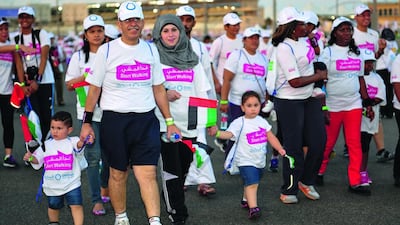Data gleaned from a nationwide diabetes screening programme of more than 12,000 people will help health authorities plan future services and improve public education on the condition.
Recently released results from a 100-day joint project between the Ministry of Health and Prevention (MoHP), show health authorities and the private sector diagnosed more than 1,000 people with either diabetes or pre-diabetes.
Medics were screening for glycated haemoglobin to indicate how much sugar there had been in the patient's blood in the months before the test.
Artificial intelligence will now use the data to predict the consequences of the disease and administer early preventive treatment to those with pre-diabetes to limit their dependence on long-term medication.
By encouraging a healthy lifestyle, in addition to focusing on the importance of early detection of diseases and risk factors, we can prevent chronic diseases before they occur
Dr Buthaina Bin Belaila,
head of non-communicable diseases at the MoHP
Of the 12,877 people screened, 8.9 per cent, or more than 1,100, were found to have pre-diabetes.
Merck, the pharmaceutical company that managed the screening programme, expected the number of people with pre-diabetes to decrease after six-month medical follow-ups, once people were given support to manage the condition.
The serious health condition results from elevated blood sugar levels that are not high enough to lead to full-blown Type 2 diabetes, which can be avoided with healthy lifestyle changes.
Ahmed Fadl, general manager at Merck Gulf, which teamed up with health authorities to conduct screenings, said the campaign was much-needed in a nation with climbing rates of Type 2 diabetes.
“This is a disease that's very common in the region, especially here in the UAE,” he said.
“The problem of diabetes doesn't stand only on the disease itself, but the complications that develop in patients for years.
“The importance of this programme is to bring awareness and bridge the gap between disease diagnosis and treatment.
"It is a comprehensive project, from screening to diagnosis to treatment and follow-ups with patients, with lifestyle management treatment options and consultations.
“Around 70 per cent of pre-diabetic patients don't know they have the condition.
“This is where you need to not only make them aware, but also take actions and start diagnosing themselves.”
Nationwide campaign
The campaign, which began in October, was aimed at expanding comprehensive services across all parts of the country, providing support and information on how to manage diabetes through digital questionnaires.
Screening was completed for those at high risk, based on family history, body mass index, weight and lifestyle.
Medical consultations were then provided to treat and control pre-diabetes by linking the examination to the course of treatment, with medics following up with patients after three and then six months. Remote counselling was also provided.
By understanding the prevalence of pre-diabetes in the community, it is hoped the screening programme can help reduce the number of people going on to develop Type 2 diabetes, which often requires lifelong medical care.
National agenda
A dedicated hotline (800-3422 328) was established to support the project to provide follow-ups and answer public queries.
"The success achieved by conducting more than 12,000 tests for the early detection of diabetes nationwide within 100 days represents a quantum leap towards achieving our goals in reducing the prevalence of the disease,” said Dr Salem Al Darmaki, adviser to the Minister of Health and Prevention.
The numbers diagnosed during the 100-day campaign reflected previous population totals, too.
According to the International Diabetes Federation, in 2021 about 12.3 per cent of the UAE's adult population was diagnosed with diabetes, almost a million people.
It is hoped a wider campaign can be extended in the near future.
“The next step is to expand the roll-out even further next year, perhaps with an even larger programme,” said Mr Fadl.
“We are partnering with the Ministry of Health to bring artificial intelligence to predict high-risk patients through patient profiles.
“These are either stored digitally via Emirates ID or in the hospitals, so they are all connected to the Ministry of Health database.
“It is here where AI can identify those high-risk patients to direct them towards consultations and a change in their lifestyle.”
The MoHP aims to enhance preventive aspects of care to reduce the rate of lifestyle-related issues such as heart disease, cancer and diabetes.
It also aims to bolster health systems in preparation for future community demands on services.
“By encouraging a healthy lifestyle, in addition to focusing on the importance of early detection of diseases and risk factors, we can prevent chronic diseases before they occur,” said Dr Buthaina Bin Belaila, head of non-communicable diseases at the MoHP.
Weight loss – an important factor in reducing diabetes risk – is being tackled at Ras Al Khaimah Hospital where an annual campaign to encourage a healthier lifestyle received record registrations last month.
The scheme, which runs until March 4, offers cash prizes of Dh300 per kilogram for those losing the most weight. More than 18,000 people have signed up.
Meanwhile, Abu Dhabi Stem Cells Centre has joined forces with Kyoto University's Centre for iPS Cell Research and Application and Japanese biotech firm Rege Nephro to develop innovative new diabetes treatments.
Under the research, skin and blood cells are extracted and reprogrammed to replicate tissue cells damaged by diabetes.
The cell therapy promises new treatment options for both Type 1 and 2 diabetes.
"With the Department of Health – Abu Dhabi support in innovation and research, we believe this partnership will pave the way for transformative healthcare solutions in our region and beyond,” said Dr Yendry Ventura, chief executive at the Stem Cells Centre and adjunct professor at UAE University.
Tips to avoid getting scammed
1) Beware of cheques presented late on Thursday
2) Visit an RTA centre to change registration only after receiving payment
3) Be aware of people asking to test drive the car alone
4) Try not to close the sale at night
5) Don't be rushed into a sale
6) Call 901 if you see any suspicious behaviour
The%20specs
%3Cp%3E%3Cstrong%3EEngine%3A%20%3C%2Fstrong%3E77kWh%202%20motors%0D%3Cbr%3E%3Cstrong%3EPower%3A%20%3C%2Fstrong%3E178bhp%0D%3Cbr%3E%3Cstrong%3ETorque%3A%20%3C%2Fstrong%3E410Nm%0D%3Cbr%3E%3Cstrong%3ERange%3A%20%3C%2Fstrong%3E402km%0D%3Cbr%3E%3Cstrong%3EPrice%3A%20%3C%2Fstrong%3EDh%2C150%2C000%20(estimate)%0D%3Cbr%3E%3Cstrong%3EOn%20sale%3A%20%3C%2Fstrong%3ETBC%3C%2Fp%3E%0A
Benefits of first-time home buyers' scheme
- Priority access to new homes from participating developers
- Discounts on sales price of off-plan units
- Flexible payment plans from developers
- Mortgages with better interest rates, faster approval times and reduced fees
- DLD registration fee can be paid through banks or credit cards at zero interest rates
UAE v Gibraltar
What: International friendly
When: 7pm kick off
Where: Rugby Park, Dubai Sports City
Admission: Free
Online: The match will be broadcast live on Dubai Exiles’ Facebook page
UAE squad: Lucas Waddington (Dubai Exiles), Gio Fourie (Exiles), Craig Nutt (Abu Dhabi Harlequins), Phil Brady (Harlequins), Daniel Perry (Dubai Hurricanes), Esekaia Dranibota (Harlequins), Matt Mills (Exiles), Jaen Botes (Exiles), Kristian Stinson (Exiles), Murray Reason (Abu Dhabi Saracens), Dave Knight (Hurricanes), Ross Samson (Jebel Ali Dragons), DuRandt Gerber (Exiles), Saki Naisau (Dragons), Andrew Powell (Hurricanes), Emosi Vacanau (Harlequins), Niko Volavola (Dragons), Matt Richards (Dragons), Luke Stevenson (Harlequins), Josh Ives (Dubai Sports City Eagles), Sean Stevens (Saracens), Thinus Steyn (Exiles)
Real estate tokenisation project
Dubai launched the pilot phase of its real estate tokenisation project last month.
The initiative focuses on converting real estate assets into digital tokens recorded on blockchain technology and helps in streamlining the process of buying, selling and investing, the Dubai Land Department said.
Dubai’s real estate tokenisation market is projected to reach Dh60 billion ($16.33 billion) by 2033, representing 7 per cent of the emirate’s total property transactions, according to the DLD.
Infiniti QX80 specs
Engine: twin-turbocharged 3.5-liter V6
Power: 450hp
Torque: 700Nm
Price: From Dh450,000, Autograph model from Dh510,000
Available: Now
Specs
Engine: 51.5kW electric motor
Range: 400km
Power: 134bhp
Torque: 175Nm
Price: From Dh98,800
Available: Now
Game Of Thrones Season Seven: A Bluffers Guide
Want to sound on message about the biggest show on television without actually watching it? Best not to get locked into the labyrinthine tales of revenge and royalty: as Isaac Hempstead Wright put it, all you really need to know from now on is that there’s going to be a huge fight between humans and the armies of undead White Walkers.
The season ended with a dragon captured by the Night King blowing apart the huge wall of ice that separates the human world from its less appealing counterpart. Not that some of the humans in Westeros have been particularly appealing, either.
Anyway, the White Walkers are now free to cause any kind of havoc they wish, and as Liam Cunningham told us: “Westeros may be zombie land after the Night King has finished.” If the various human factions don’t put aside their differences in season 8, we could be looking at The Walking Dead: The Medieval Years.
INFO
Everton 0
Arsenal 0
Man of the Match: Djibril Sidibe (Everton)
Company profile
Company: Verity
Date started: May 2021
Founders: Kamal Al-Samarrai, Dina Shoman and Omar Al Sharif
Based: Dubai
Sector: FinTech
Size: four team members
Stage: Intially bootstrapped but recently closed its first pre-seed round of $800,000
Investors: Wamda, VentureSouq, Beyond Capital and regional angel investors
The specs: 2018 GMC Terrain
Price, base / as tested: Dh94,600 / Dh159,700
Engine: 2.0-litre turbocharged four-cylinder
Power: 252hp @ 5,500rpm
Torque: 353Nm @ 2,500rpm
Transmission: Nine-speed automatic
Fuel consumption, combined: 7.4L / 100km
Our family matters legal consultant
Name: Hassan Mohsen Elhais
Position: legal consultant with Al Rowaad Advocates and Legal Consultants.
EXPATS
%3Cp%3E%3Cstrong%3EDirector%3A%3C%2Fstrong%3E%20Lulu%20Wang%26nbsp%3B%3C%2Fp%3E%0A%3Cp%3E%3Cstrong%3EStars%3A%3C%2Fstrong%3E%20Nicole%20Kidman%2C%20Sarayu%20Blue%2C%20Ji-young%20Yoo%2C%20Brian%20Tee%2C%20Jack%20Huston%3C%2Fp%3E%0A%3Cp%3E%3Cstrong%3ERating%3A%3C%2Fstrong%3E%204%2F5%3C%2Fp%3E%0A
UAE currency: the story behind the money in your pockets
UAE currency: the story behind the money in your pockets
How to wear a kandura
Dos
- Wear the right fabric for the right season and occasion
- Always ask for the dress code if you don’t know
- Wear a white kandura, white ghutra / shemagh (headwear) and black shoes for work
- Wear 100 per cent cotton under the kandura as most fabrics are polyester
Don’ts
- Wear hamdania for work, always wear a ghutra and agal
- Buy a kandura only based on how it feels; ask questions about the fabric and understand what you are buying
Wicked: For Good
Director: Jon M Chu
Starring: Ariana Grande, Cynthia Erivo, Jonathan Bailey, Jeff Goldblum, Michelle Yeoh, Ethan Slater
Rating: 4/5
Zodi%20%26%20Tehu%3A%20Princes%20Of%20The%20Desert
%3Cp%3E%3Cstrong%3EDirector%3A%20%3C%2Fstrong%3EEric%20Barbier%26nbsp%3B%3C%2Fp%3E%0A%3Cp%3E%3Cstrong%3EStarring%3A%20%3C%2Fstrong%3EYoussef%20Hajdi%2C%20Nadia%20Benzakour%2C%20Yasser%20Drief%3C%2Fp%3E%0A%3Cp%3E%3Cstrong%3ERating%3A%3C%2Fstrong%3E%204%2F5%3C%2Fp%3E%0A
Other ways to buy used products in the UAE
UAE insurance firm Al Wathba National Insurance Company (AWNIC) last year launched an e-commerce website with a facility enabling users to buy car wrecks.
Bidders and potential buyers register on the online salvage car auction portal to view vehicles, review condition reports, or arrange physical surveys, and then start bidding for motors they plan to restore or harvest for parts.
Physical salvage car auctions are a common method for insurers around the world to move on heavily damaged vehicles, but AWNIC is one of the few UAE insurers to offer such services online.
For cars and less sizeable items such as bicycles and furniture, Dubizzle is arguably the best-known marketplace for pre-loved.
Founded in 2005, in recent years it has been joined by a plethora of Facebook community pages for shifting used goods, including Abu Dhabi Marketplace, Flea Market UAE and Arabian Ranches Souq Market while sites such as The Luxury Closet and Riot deal largely in second-hand fashion.
At the high-end of the pre-used spectrum, resellers such as Timepiece360.ae, WatchBox Middle East and Watches Market Dubai deal in authenticated second-hand luxury timepieces from brands such as Rolex, Hublot and Tag Heuer, with a warranty.
Sholto Byrnes on Myanmar politics
Another way to earn air miles
In addition to the Emirates and Etihad programmes, there is the Air Miles Middle East card, which offers members the ability to choose any airline, has no black-out dates and no restrictions on seat availability. Air Miles is linked up to HSBC credit cards and can also be earned through retail partners such as Spinneys, Sharaf DG and The Toy Store.
An Emirates Dubai-London round-trip ticket costs 180,000 miles on the Air Miles website. But customers earn these ‘miles’ at a much faster rate than airline miles. Adidas offers two air miles per Dh1 spent. Air Miles has partnerships with websites as well, so booking.com and agoda.com offer three miles per Dh1 spent.
“If you use your HSBC credit card when shopping at our partners, you are able to earn Air Miles twice which will mean you can get that flight reward faster and for less spend,” says Paul Lacey, the managing director for Europe, Middle East and India for Aimia, which owns and operates Air Miles Middle East.
Results
%3Cp%3E%0D%3Cstrong%3EElite%20men%3C%2Fstrong%3E%0D%3Cbr%3E1.%20Amare%20Hailemichael%20Samson%20(ERI)%202%3A07%3A10%0D%3Cbr%3E2.%20Leornard%20Barsoton%20(KEN)%202%3A09%3A37%0D%3Cbr%3E3.%20Ilham%20Ozbilan%20(TUR)%202%3A10%3A16%0D%3Cbr%3E4.%20Gideon%20Chepkonga%20(KEN)%202%3A11%3A17%0D%3Cbr%3E5.%20Isaac%20Timoi%20(KEN)%202%3A11%3A34%0D%3Cbr%3E%3Cstrong%3EElite%20women%3C%2Fstrong%3E%0D%3Cbr%3E1.%20Brigid%20Kosgei%20(KEN)%202%3A19%3A15%0D%3Cbr%3E2.%20Hawi%20Feysa%20Gejia%20(ETH)%202%3A24%3A03%0D%3Cbr%3E3.%20Sintayehu%20Dessi%20(ETH)%202%3A25%3A36%0D%3Cbr%3E4.%20Aurelia%20Kiptui%20(KEN)%202%3A28%3A59%0D%3Cbr%3E5.%20Emily%20Kipchumba%20(KEN)%202%3A29%3A52%3C%2Fp%3E%0A
CHELSEA SQUAD
Arrizabalaga, Bettinelli, Rudiger, Christensen, Silva, Chalobah, Sarr, Azpilicueta, James, Kenedy, Alonso, Jorginho, Kante, Kovacic, Saul, Barkley, Ziyech, Pulisic, Mount, Hudson-Odoi, Werner, Havertz, Lukaku.







